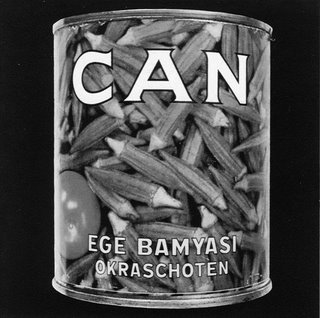
Can formed in Cologne in 1968 comprising bass guitarist Holger Czukay, keyboard player Irmin Schmidt, guitarist Michael Karoli, and drummer Jaki Liebezeit, along with original member David Johnson, an American composer, flutist, and electronic musician who left in 1969 after the band had begun taking a rock direction. They used the names "Inner Space" and "The Can" before finally settling on Can. Liebezeit subsequently suggested the backronym "communism, anarchism, nihilism" for the band's name.[4]
In the autumn of 1968, they enlisted the creative, highly rhythmic, but often confrontational American vocalist Malcolm Mooney, with whom they recorded the material for an album, Prepared to Meet Thy Pnoom (which did not get released until 1981, under the name Delay 1968, as their record company rejected it[5]). The band then decided to record another album of original material from scratch, which later became Monster Movie, released in 1969. Mooney's bizarre and (often apparently psychotic) ranting stood in contrast to the stark minimalism of the music, which was influenced particularly by garage rock, funk and psychedelic rock. Repetition was stressed on bass and drums, particularly on the epic "Yoo Doo Right" which had been edited down from a six-hour improvisation to take up a mere single side of vinyl.
Mooney returned to America soon afterwards on the advice of a psychiatrist after being told that getting away from the chaotic music of Can would be better for his mental health.[6] He was replaced by the less overtly challenging Damo Suzuki, a young Japanese traveller found busking outside a cafe by Czukay and Liebezeit. The band's first record with Suzuki was Soundtracks, released in 1970, which also contained two tracks recorded with Mooney.
The next few years saw Can release their most acclaimed works, which arguably did as much to define the krautrock genre as those of any other group. While their earlier recordings tended to be loosely based on traditional song structures, on their mid-career albums the band reverted to an extremely fluid improvisational style. The double album Tago Mago (1971) is often seen as a groundbreaking, influential and deeply unconventional record, based on intensely rhythmic jazz-inspired drumming, improvised guitar and keyboard soloing (frequently intertwining each other), extensive tape edits, and Suzuki's idiosyncratic vocalisms.
Tago Mago was followed by Ege Bamyasi (1972), a more accessible but still avant-garde record which featured the catchy "Vitamin C" and the Top 40 German hit "Spoon." Next was Future Days (1973), an unassuming but quietly complex record which represents an early example of ambient music and is perhaps the band's most critically successful record. Also included on this album was the refreshingly unexpected pop song "Moonshake".
Suzuki left soon after the recording of the latter album to marry his German wife and become a Jehovah's Witness, and the vocals were taken over by Karoli and Schmidt[7], although after the depature of Suzuki, less of their tracks featured vocals, as Can found themselves experimenting with the ambient music they began making with Future Days.
CAN
pass: mud
1 comment:
Tago Mago and Ege Bamyasi are my favourite Can records. Oh Yeah, Halleluhwah and Spoon...great tracks.
Glad to have found your blog.
Keep on keepin on,
The Good Heads
Post a Comment